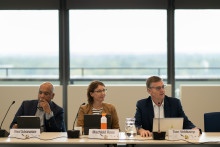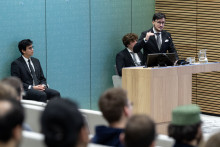The student assistant freeze was one of the so-called emergency measures announced by UT in the summer of 2024: only in exceptional cases was it still permitted to employ student assistants. The Faculty Council of Engineering Technology recently surveyed both students and staff to assess the impact.
‘For several reasons,’ explain initiators Wieteke de Kogel-Polak and Laura Portos-Amill on behalf of the council. ‘Among other things, to examine differences in impact and whether people have good ideas for solutions. But above all: as a participatory body, we represent students and staff, so we wanted to make the impact visible and raise the issue,’ says De Kogel-Polak.
Last month, 117 students from the faculty completed the survey. Eighty-four percent indicated they noticed a shortage of student assistants. This manifests in delayed grading, longer waiting times, and less feedback during tutorials.
Education quality under pressure
Strikingly, nearly two-thirds of students believe that the absence of student assistants negatively affects education quality. Forty-two percent also feel that assessment and grading have suffered due to the measure. In particular, the shift from open-ended exam questions to multiple-choice formats is seen as problematic by some students.
As a teacher, De Kogel-Polak recognises the issue all too well. ‘I was forced to convert an exam to multiple choice. It wasn’t a luxury choice. With student assistants gone, there simply wasn’t enough capacity to properly mark an open-question exam.’
UT partly compensates for the loss of student assistants by assigning PhD candidates to teaching duties. Student reactions are mixed: about one-third report negative experiences, describing PhDs as relatively unprepared and unmotivated in the classroom. Another third sees the opposite: motivated, helpful, and well-informed PhDs.
Increased workload
In the summer, the Faculty Council surveyed PhDs and teaching staff about the situation. Of the 82 respondents, 79 percent said their workload had increased, mainly because tasks previously handled by student assistants now fall on their own shoulders.
The survey also revealed how difficult it was to reorganise teaching. In 68 percent of cases, finding replacements proved challenging. Respondents pointed to overwork: ‘When everyone is overloaded, people can no longer help each other.’
Deploying PhDs was no easy task either. Some groups already had experience with this and therefore did not need to make major changes to their teaching. Elsewhere, it was harder to involve PhDs and postdocs. In some cases, supervisors ‘blocked’ them from teaching to protect their research time.
Portos-Amill and De Kogel-Polak observed major differences within the faculty regarding the (expected) use of PhDs. ‘In my research group, it was already common for PhDs to have teaching tasks,’ says Portos-Amill. ‘So the impact was relatively minor. In other places, much bigger problems arose. More clarity and guidance would help.’ De Kogel-Polak adds: ‘As a teacher, you have some say over student assistants, but not over PhDs. That’s up to their supervisor, which complicates things.’
Easing the measure?
Rector Tom Veldkamp recently told the University Council that the University Education Committee is working on new guidelines for employing student assistants. ‘They add value, also for education quality. We also want to look at the role of PhDs in this area. It’s still very much a work in progress,’ said the rector.
Students and lecturers should not expect an immediate relaxation of the measure. At the earliest, UT may loosen the reins in spring 2026, provided there is budgetary room.
De Kogel-Polak and Portos-Amill would prefer easing sooner rather than later. Their faculty board acknowledges the problem, but solutions are not easily found. ‘Returning to pre-measure levels isn’t realistic. We are aware of that,’ says De Kogel-Polak. ‘But there should be more room again, especially in the places where student assistants are most needed.’







